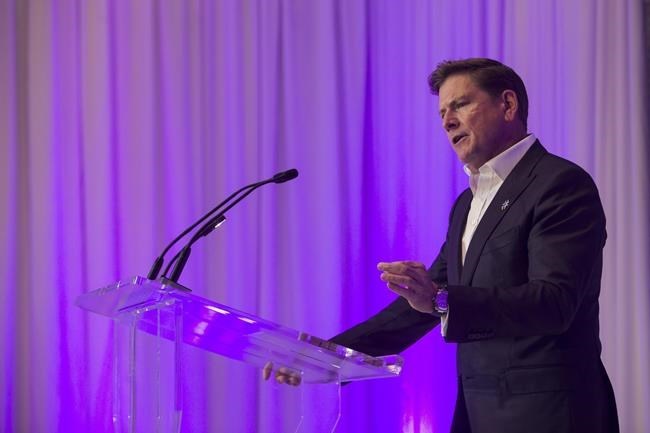GATINEAU, Que. — Telus Corp. could cut about $1 billion of spending and 5,000 jobs over the next five years if the CRTC requires Canada's wireless companies to open their facilities to virtual network operators, chief executive Darren Entwistle said Thursday.
He revealed those estimates in the final minutes of nearly four hours of public hearings before the Canadian Radio-television and Telecommunications Commission, which has proposed giving mobile virtual network operators, or MVNOs, a mandate to connect their services to the big national networks built and operated by Telus, Bell and Rogers.
The Telus position is that Canada's wireless market is already extremely competitive, prices are actually quite affordable contrary to popular belief and the arrival of MVNOs would set back the deployment of 5G networks.
Entwistle ended the presentation with a flourish, by volunteering to submit the Telus board's instructions for managers to start making plans for cutting spending and jobs if the CRTC chooses MVNOs over facilities-based carriers.
"There are some views that this is just theatre perpetrated by the incumbents, and that if MVNOs come to fruition or there's an enforced second 25 per cent reduction (of retail prices) we will go on with status quo investing," Entwistle said.
"So one of the additional things I'd like to file with you, in confidence, that I've brought here today, is a board resolution at Telus, signed by all of our board directors, instructing management to pursue an investment reduction plan and a job reduction plan and a philanthropic-giving reduction plan, should these eventualities present themselves.
"We're discussing numbers where the reduction ... is in the vicinity of a billion dollars of reduced investment over the next five years, reduced employment is in the zip code of 5,000 jobs over the next five years."
Entwisle asked the CRTC commissioners to consider all of the factors before deciding whether to diverge from a long-standing policy of favouring facilities-based carriers.
Historically, successive Liberal and Conservative governments and the CRTC have favoured facilities-based network operators because they build and operate most of the country's telecom infrastructure
Entwisle was one of several high-level executives from Canada's largest national and regional wireless service providers that have been united in their rejection of mandated MVNOs, which would be given the right to tap into their facilities.
Bell Canada CEO Mirko Bibic said Wednesday that any form of MVNO mandate would an "aggressive'' regulatory intervention, at a time when facilities-based networks are building Canada's fifth-generation wireless backbone.
"We should not be taking risks with the pace and extent of 5G deployment in Canada," Bibic said.
On Thursday, all of the CRTC's morning and much of its afternoon were spent with Entwistle and his team of executives and consultants repeatedly saying Canada doesn't need mobile virtual network operators.
The Telus position was that MVNOs, haven't survived long in other markets because they don't have a sustainable business model and therefore they won't provide consumers with a long-term benefit.
Even on the issue of the prices and the affordability of wireless data plans, Entwistle challenged the widely held belief that Canadians pay too much compared with what's available in other countries.
"Do we have a wireless affordability issue in Canada? Surprisingly, no we do not," Entwistle said in his opening remarks.
He said third-party studies had found wireless pricing in Canada "is amongst the most competitive in the world — with our country's unlimited plans ranking best, No. 1 in the G7, based on speed, latency, accessibility — and, yes, pricing."
He cited a 2020 analysis by the international consulting firm PwC that estimated the average Canadian family spent about 1.6 per cent of its disposable household income on wireless services.
By comparison, PwC found the U.S. average was 2.6 per cent and Australia's average was 2.1 per cent, he said.
— by David Paddon in Toronto.
This report by The Canadian Press was first published Feb. 20, 2020.
Companies in this story: (TSX:BCE, TSX:RCI.B, TSX:QBR.B, TSX:T, TSX:SJR.B)
The Canadian Press



